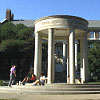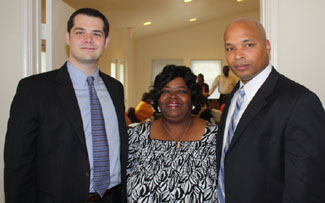SMU law students and AT&T lawyers in Dallas answer calls for free advice
The Small Business Clinic in SMU's Dedman School of Law helps new businesses with complex legal issues.

By ANDREW D. SMITH
The Dallas Morning News
New businesses need legal help. Contracts, liability, intellectual property, taxes, even the act of incorporation – complex issues abound.
 (l. to r.) Justin Freeman, SMU Dedman Law School student, Pat Stephens, Director of Westmoreland Heights Community Center, and Darrell Guy, General Attorney for AT&T Inc., at the community center. The center received assistance from the law school's Small Business Clinic, where AT&T lawyers volunteer. |
Some firms can buy help. Others are forced to try everything themselves. Here in Dallas, a few lucky businesses enjoy a third option: free help from Southern Methodist University and AT&T Inc.
The Small Business Clinic at SMU's law school serves 27 fledgling operations that range from landscapers to high-tech start-ups to nonprofit groups.
Each client gets a third-year law student. Each student works with an attorney from AT&T. Each case produces a tiny benefit for the economy and a huge benefit for all involved.
"We actually help people realize their dreams, which is just about the most satisfying thing I can think of," said Darrell Guy, a general counsel at AT&T who coordinates his company's involvement with the clinic.
In West Dallas, for example, the seniors and students who get food and companionship at the Westmoreland Heights Neighborhood Association owe their sanctuary to the program.
The association is the creation of Patricia Stephens, who believes the Lord struck her with carpal tunnel syndrome to force her out of office work and into philanthropy.
Stephens spent half a decade lobbying businesses, bureaucrats and charities for the money, materials and legal documents she needed to build and operate a community center in the neighborhood she has called home since 1964.
But even Stephens – a woman known to get the best of contractors and mechanics – felt powerless against the government attorneys who said she owed them property taxes.
When she heard that SMU was offering free legal help, she jumped.
"Regular folks can do a lot on their own, but sometimes you need help," Stephens said.
"When the lawyers start knocking on your door, you need help."
SMU's law school, like many of its counterparts, has long trained students and served the community by doing pro bono work for needy individuals.
More recently, the school launched two clinics to provide free tax and business services.
Freeing businesses from tax liens may lack the glamour of freeing innocents from death row, but students get vital experience and businesses get vital aid.
Until last year, a single professor monitored all the cases from both clinics. This arrangement limited caseloads, but SMU saw no way to expand – until the school received a call from a prominent alumnus.
AT&T general counsel Wayne Watts told SMU last summer that the company was moving to Dallas and looking for opportunities in public service law.
SMU asked for AT&T lawyers to oversee small-business cases and mentor law students. Watts agreed and "suggested" that Guy, a fellow SMU alumnus, "volunteer" to oversee the program.
Now the program has more professional help than students.
"Students work for the clinic while they take a particular class, so the clinic is now limited by the size of that class," said Justin Freeman, one of two students who oversee the operation this term.
Still, with so much help available, expansion might make sense.
"It's both a tremendous learning opportunity and a way to do some real good," Freeman said.
Some cases run a couple weeks, but many drag on for months, particularly when they require action from government agencies.
Freeman spent nearly a year getting every tax issue straightened out for Stephens and her neighborhood association.
So far, the clinic has relied on word of mouth to attract clients. Excepting a few obviously prosperous firms, it has helped nearly every organization that has asked.
Past clients include the Posh Pets grooming salon, a landscaping firm and the Community Emergency Response Team, a national volunteer organization dedicated to disaster preparedness.
Some have come to the clinic before opening their doors. Others have come after hitting specific legal problems. All have been over their heads.
"The tax people wanted to take the whole place because I hadn't done some paperwork right," Stephens said.
"It wasn't right, but it was legal. You have to fight lawyers with lawyers."
# # #